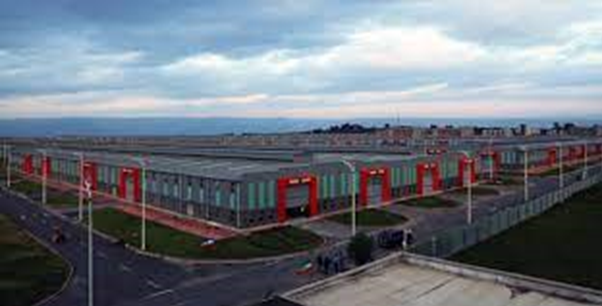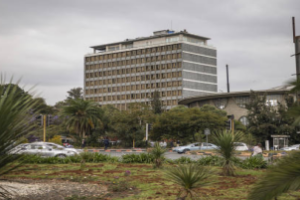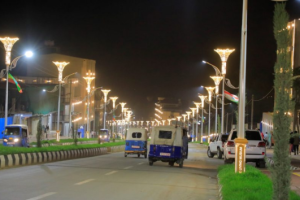
The government’s ten-year perspective development plan clearly stipulates that it is impossible to attain structural economic change without expanding industrialization and to that end, due attention is rendered to the expansion of the manufacturing sector.
As it is obviously understood, Ethiopia is an agrarian economy where about 80% of the labor force is engaged in subsistence farming. Though agriculture has been practiced for millennia in Ethiopia, the sector still uses traditional tools for plowing and uses less modern inputs such as fertilizer, pesticides, and herbicides, which results in less output. The rain fed nature of the sector also makes it vulnerable to extreme climate conditions with disastrous consequences. Hence, along with modernizing the sector, shifting the excess labor stranded there to the non-farming sectors such as manufacturing and services has been taken as a way out for attaining structural change.
Recently, on one occasion, the Minister of Planning and Development, Fitsum Assefa (PhD), announced that the government emphasizes the expansion of manufacturing. As to her, it attracts foreign investment, creates job opportunities for thousands, creates linkage with agriculture through consuming raw materials and providing agricultural inputs, supports import substitution schemes, boosts exports, and helps innovation and entrepreneurship skills. Moreover, it accelerates the structural change. The sector also uplifts the nation’s economy from low production and productivity to a higher level.
Cognizant of the value of the sector, the government established the Industrial Parks’ Development Corporation (IPDC) and has constructed 13 industrial parks in various parts of the country so far, of which many of them have been operational.
The government has also given full support to the sector via allocating loan from commercial banks, allowing industrialists to import capital goods free of duty and providing tax holiday.
According to the report obtained from the corporation, the IPDC is becoming an engine for the rapid industrialization that nurtures manufacturing industries, accelerates economic transformation, promotes investment, and attracts both domestic and foreign investors. To activate both pre- and post-investment servicing, it avails serviced industrial land and pre-built factory sheds equipped with all-encompassing utilities and infrastructural facilities that fit international standards with no compromise on worker security and environmental safety. Of course, it is important to note that IPDC, in collaboration with the Ethiopian Investment Commission, the Ministry of Ethiopian Revenue and Customs Authority, and more institutions, provides a one-stop service for investors investing in designed industrial parks.
Currently, in order to strengthen its service provision capacity, the Industrial Parks Development Corporation is in the process of establishing a set of subsidiary companies in a bid to better handle the responsibilities of managing more than a dozen industrial parks in the country.
The subsidiaries under formation will be tasked with separately handling logistics, construction, consultancy, manufacturing, and agricultural supply chain services previously under the Corporation.
The development comes as the federal government moves ahead with its plans to transform industrial parks into Special Economic Zones (SEZs). Lawmakers have introduced legislation that would allow the parks to make the transition, which would entail additional logistics and trade capabilities on top of the manufacturing mandates they already handle.
All the 13 industrial parks developed and managed by IPDC are slated to make the transition.
“We are reforming IPDC to transform it from an entity that leases out factory sheds to a fully commercial one. We’re establishing new business units as IPDC subsidiaries,” Fisseha Yitagesu (PhD), Head of the Corporation, told investors during a panel discussion took place recently.
The state-owned Corporation is looking to tap in on businesses related to SEZs. Its executives plan to establish a logistics services subsidiary to cater to investors leasing space in SEZs. The Corporation is in the process of procuring heavy trucks to move goods between ports and SEZs, according to Fisseha.
Another IPDC arm is slated to provide consultancy, valuation, and project advisory services for investors, while an agricultural subsidiary will supply raw materials to factories in SEZs, according to the CEO.
Fisseha also disclosed plans to form a subsidiary engaged in the hospitality industry. “Industrial parks and SEZs will gradually change into urban centers so they’ll need hospitality services,” Fisseha said. The move will likely ensure continued state dominance in the upcoming SEZs through government affiliated enterprises.
However, the CEO said the Corporation is also looking to work with private firms in joint ventures. The Corporation is tasked with operating the 13 industrial parks that have been erected across the country over the last decade. There are additional 10 privately-run industrial parks in Ethiopia.
In another development, the IPDC recently has revealed a significant increase in investment and production activities at Ethiopia’s industrial parks, highlighting their crucial role in import substitution and export diversification.
The 13 industrial parks are specialized in various manufacturing sectors including textile, agro-processing and pharmaceuticals.
According to the IPDC Deputy Chief Executive Officer, Addisu Mamo, the parks have been established with the vision to make the country a leading manufacturing hub, and the government places high focus on industrial parks development and expansion.
He further indicated that recent investments by both local and foreign investors have resulted in the occupation of most industrial park units, with a utilization rate of 85% and the registered growth witnessed due to the IPDC’s reform initiatives, including streamlined procedures and enhanced customer services.
The growing prominence of industrial parks in manufacturing essential goods, such as pharmaceuticals, textiles, and agricultural products attributed to the results. The Kilinto Industrial Park’s contribution to substitute imported pharmaceuticals and the Debre Birhane and Bole Lemi industrial parks’ ability to meet the demand for malt by local beer producers played vital role in accelerating productivity.
“We have been registering remarkable achievements. For instance, we have encouraging activities in improving import substitution in pharmaceuticals as we have been spending huge foreign currency to import pharmaceuticals. We have been working to reverse this and currently obtaining good results.
Additionally, we have also recorded concrete achievements in agro-processing. The factories located at Debre Birhan and Bole Lemi industrial parks have been able to supply malt to our beer producers 100%. Previously, the factories used to import malt from various European countries. These malt factories have already been in process to export their product as they have covered fully the domestic demand,” the deputy CEO said.
Moreover, the Jimma Industrial Park is actively receiving raw materials from neighboring avocado farmers, creating a sustainable market chain. Accordingly, the Jimma Industrial Park’s avocado-based edible oil production is benefiting up to 70,000 avocado farmers, he said.
In the textile and garment sector, products manufactured in industrial parks meet global quality standards and are exported to major markets, including the United States and Europe. Textile and garment manufacturers are also contributing to import substitution by producing uniforms for various organizations, reducing the need for foreign imports.
IPDC’s efforts to foster mutually beneficial partnerships between industrial parks and surrounding communities are also evident. For instance, a Chinese company is establishing a camel milk processing facility, providing a valuable market outlet for the local camel farmers.
Overall, industrial parks are playing a pivotal role in Ethiopia’s economic development by substituting imports, diversifying exports, and creating employment.
As investment and production continue to grow, these parks are poised to further strengthen the country’s economic competitiveness by strengthening import substitution and export trade.
Import substitution of textile and food items has already been bearing fruit. It is indicated that 100% of beer barley seed demand in the country has been covered with domestic products.
The nation has begun exporting beer barely seeds as the country was able to produce surplus. Ethiopia is also working to fully substitute imports of food and beverage products as well as textiles and garments in the next three years.
BY ABEBE WOLDEGIORGIS
THE ETHIOPIAN HERALD THURSDAY 19 SEPTEMBER 2024





